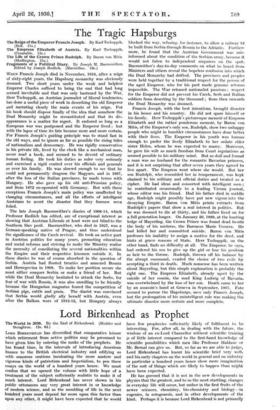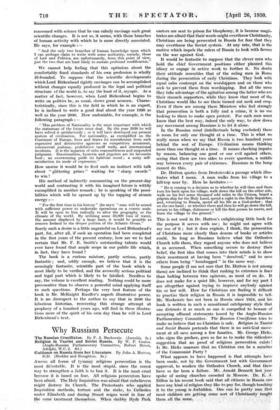Lord Birkenhead as Prophet
The World in 2030. By the Earl of Birkenhead. (Hodder and
Stoughton. 12s. ed.) ,
Loan BIRKENHEAD has diversified that comparative leisure which retirement from active politics may be presumed to have given him by entering the ranks of the prophets. He has found time, in the intervals of introducing American finance to the British electrical industry and edifying us with sonorous orations inculcating the more austere and vigorous kinds of patriotism and Imperialism, to pen these essays on the world of a hundred years hence. We must confess that we opened the volume with little hope of a treatment of the subject sufficiently realistic to make it of much interest. Lord Birkenhead has never shown in his public utterances any very great interest in or knowledge of modern science, and as the moulding of life in the next hundred years must depend far more upon this factor than upon any other, it might have been expected that he would
have few prophecies sufficiently likely of fulfilment to be interesting. For, after all, in dealing with the future, the wisdom of an ex-Lord Chancellor without scientific training, is of little interest compared to the first-hand knowledge of scientific possibilities which men like Professor Haldane or Mr. Bernal can give us. But, so far as we are able to judge, Lord Birkenhead has learnt his scientific brief very well, and his early chapters on the world in general and on industry in particular a hundred years hence show more imagination of the sort of things which are likely to happen than might have been expected.
He has guessed that it is not in the new developments in physics that the greatest, and to us the most startling, changes in everyday life will occur, but rather in the first fruits of the newer sciences, chemistry, bio-chemistry and biology—in eugenics, in ectogenesis, and in other developments of the kind. Perhaps it is because Lord Birkenhead is not primarily !Concerned with science that he can calmly envisage such great scientific changes. It is not so, it seems, with those branches of human activity with which he is more directly associated. He says, for 'example f-•—
" And the only two branches of human knowledge upon which I can perhaps claim to write with some authority, *namely, those of Law and Politics, are unfortunately, from this point of view, just the two that are least likely to sustain profound modification."
We cannot help feeling that this optimism about the comfortably fixed standards of his own profession is wholly ill-founded. To suppose that the "scientific developments which Lord Birkenhead rightly envisages can be accomplished without changes equally profound in the legal and political structure of the world is, to say the least of it, myopic. As a matter of fact, however, when Lord Birkenhead begins to write on politics he, as usual, shows great acumen. Charac- teristically, since this is the field in which he is an expert, he is inclined to write a good deal about the year 1930 as well' al the year 2030. How undeniable, for example, is the followMg paragraph :—
-." This .pioblem of Nationality is the most important with which the statesman of the future must deal. By the year 2030 he will have solved it satisfactorily ; or it will have destroyed our present system of civilization. For nationality, as exemplified on the Continent of Europe, lives and draws its nourishment from such expensive and destructive agencies as competitive armament, commercial jealousy, prohibitive tariff walls, and international incidents. It is the negation of calm reasonableness and suspended judgment. • Emotionalism, hysteria and jingoism are its favourite food • . an overweening pride its habitual mood ; a noisy self- satisaction its mode of expression." -
How unwise it would be to feed such an instinct with talk about " glittering prizes " waiting for sharp swords " to win I His method of indirectly commenting on the present-day world and contrasting it with his imagined future is wittily exemplified in another remark ; he is speaking of the possi- bilities which will be opened up by the tapping of atomic energy
For the first time in his history " (he says) " man will be armed with sufficient power to undertake operations on a cosmic scale. It will be open to him radically to alter the geography or the climate of the world. By utilizing some 50,000 tons Of water, the amount displaced by a large liner, it would be possible to remove Ireland to the deeper portion of the Atlantic Ocean."
Surely such a desire is a little ungrateful on Lord Birkenhead's part, for, after all, if such an operation had been completed in the first years of the present century, how are we to feel certain that Mr. F. E. Smith's outstanding talents would ever have found that ample scope in our public life which, in fact, they have found ?
The book is a curious mixture, partly serious, partly fantastic ; and, oddly enough, we believe that it is the seemingly fantastic, scientific part of the book which is most likely to be verified, and the avowedly serious political and legal part which is likely to be falsified. Needless to say, the volume is excellent reading. Nothing could be more provocative than to observe a powerful mind applying itself to such questions. Perhaps the very best feature of the book is Mr. McKnight Kauffer's superb illustrative power. It is no disrespect to the author to say that in 2030 the laborious historian, recovering this strange attempt at
prophecy of a hundred years ago, will find in these illustra- tions more of the spirit of his own- day than he will in Lord Birkenhead's text.





































 Previous page
Previous page